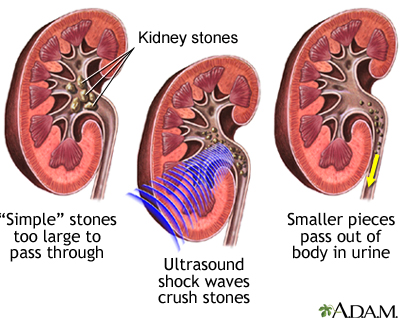The remaining particles of small stone will exit the body when a.
Kidney laser lithotripsy side effects.
This was a nonthermal safe laser that produced plasma between the tip of the fiber and the calculus fragmenting stone with a photo acoustic effect.
Bleeding around the kidney infection.
This feeling should go away within a day.
Laser lithotripsy is a way to treat kidney stones.
For several hours after the procedure you may have a burning feeling when you urinate.
You may also have bruising and discomfort in your back or abdomen.
Please use one of the following formats to cite this article in your essay paper or report.
You may have blood in your urine for 1 to 2 days after the procedure.
Laser lithotripsy is a way to treat kidney stones.
Shock wave lithotripsy for kidney stones can cause side effects such as cramps or blood in your urine.
The type of laser used with the ureteroscope is called a holmium laser.
You may feel the urge to go even if you don t need to.
More serious problems are less likely but can include.
Laser lithotripsy was first introduced commercially in the late 1980s with the pulsed dye laser which uses 504 nm of light delivered through optical quartz fibers 8.
For several hours after the procedure you may have a burning feeling when you urinate.
This feeling should go away within a day.
Drinking a lot of water can help.
A ureteroscopy that uses a laser to break up small kidney stones may take about 90 minutes.
Lithotripsy is a medical procedure that uses shock waves or a laser to break down stones in the kidney gallbladder or ureter.
You may feel the urge to go even if you don t need to.
Lithotripsy is advantageous as a method of kidney stone removal because it does not require surgery and has a 70 to 90 percent success rate in good candidates.
Drinking a lot of water can help.
The stone pieces then pass out of your body through your urine.
Shock wave lithotripsy safety and side effects.
This treatment uses a laser to break kidney stones into tiny pieces.

